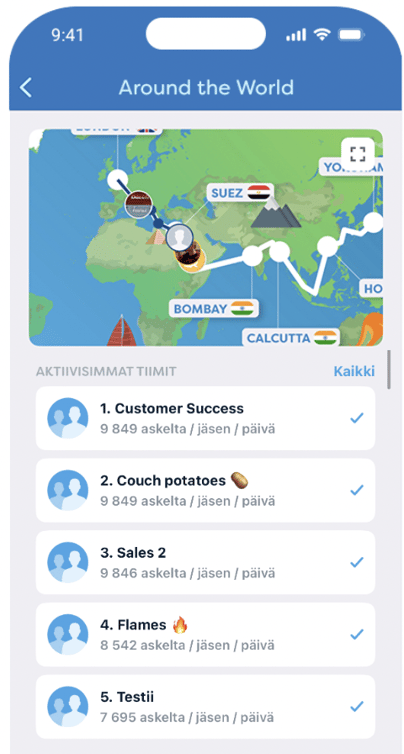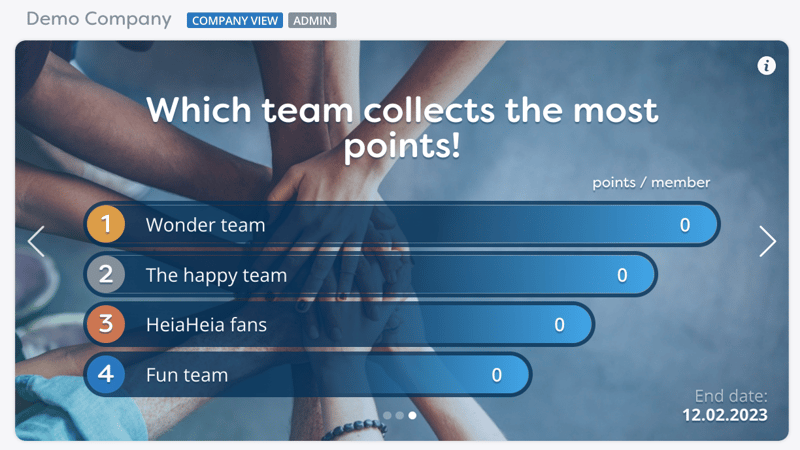Gamification is the process of using game design elements and mechanics in non-game contexts to engage and motivate people to achieve their goals. In this blog post, we'll be discussing the benefits of using game-like solutions to promote employee wellbeing and how HeiaHeia's digital employee wellbeing programs use gamification to achieve this.
One of the key benefits of using gamification in employee wellbeing programs is that it makes the program more engaging and fun for employees. By incorporating elements of game design, such as points, leaderboards, and badges, employees are more likely to participate in the program and stick with it over time. This increased engagement can lead to improved employee health and productivity, which in turn can improve a company's bottom line.
Another benefit of using gamification in employee wellbeing programs is that it can help to create a sense of community among employees. By incorporating elements such as team challenges and leaderboards, employees are more likely to engage with their colleagues and build connections with one another. This increased social interaction can help to build a sense of community and connection among employees, which can help to improve employee wellbeing and reduce feelings of isolation. There have been numerous studies that indicate a correlation between employee happiness and productivity. It is well known that happy employees are more engaged, motivated and less likely to leave the company, which in turn leads to increased productivity.
HeiaHeia's digital employee wellbeing programs are designed to promote employee wellbeing through gamification, and can help companies to improve employee engagement, retention, and productivity.
- Gamification encourages employees to participate in the wellbeing program
- They are also more likely to stick with the program over time
- Increased engagement can lead to improved employee health and productivity
- Gamification can help to create a sense of community
- Elements such as team challenges and leaderboards encourages employees to engage with their colleagues and build connections with one another
How HeiaHeia uses gamification features in its wellbeing programs
HeiaHeia's digital employee wellbeing programs are designed to increase employee engagement and motivation through gamification. The programs are inspiring and game-like solutions that help employees to improve their wellbeing and sense of community. The program includes features such as challenges, leaderboards, and social features that create a fun and engaging experience for employees. The workout content library including workday workout inspiration will help to achieve the goals in the challenge by inspiring to move more. The service will be added with virtual team building activities to increase employee engagement and motivation.
Most importantly for the employers, the program also includes analytics and reporting that can help employers to track employee progress and measure the impact of the program. Based on the the results, they might plan a reward program that encourage the employees to join the challenges.

Creating healthy habits for employees through gamification
Gamification can also be used to promote healthy habits such as regular exercise, healthy eating, and adequate sleep. By incorporating these elements into the program, employees can be motivated to engage in healthy behaviours that can lead to improved physical and mental health. For example, HeiaHeia's digital employee wellbeing program includes features such as tracking physical activity and sleep patterns, providing healthy eating recommendations and offering digital coaching and support to help employees achieve their wellness goals.

In conclusion, gamification is a powerful tool for promoting employee wellbeing. By incorporating game design elements and mechanics into employee wellbeing programs, we can increase employee engagement and motivation, and build a sense of community among employees.
HeiaHeia's digital employee wellbeing programs are designed to use gamification to achieve this, and have been proven to be successful in improving employee wellbeing and creating a sense of community. By making employee wellbeing programs more engaging and fun, employees are more likely to participate and stick with the program, leading to improved employee health and productivity.


